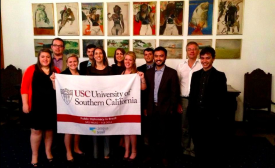south america
Yesterday, Venezuelan opposition leader Leopoldo López, whom the government has blamed for the recent protests, promised to turn himself in under one condition: that the protests continue in Caracas today. This morning, tens of thousands of people obliged. Twitter has been flooded with aerial pictures of the mass protests—many of which Venezuela’s government seems to prefer no one see, as it blocked some of them from appearing for a time, according to the company.

In early February, 7 USC Master of Public Diplomacy students embarked for São Paulo, Brazil. We arrived with just a day to get acclimated to the city before our meetings began on Monday. As students of diplomacy, the logical choice for a research trip to Brazil might be Brasilia. As the capital, it hosts the country's diplomatic corps and would certainly make a worthy case study of how diplomacy works in Brazil. While traditional diplomacy will always be worth pursuing, we are not going to Brazil to study it.
If Britain were fighting a war where 2,000 people died every year, where increasing numbers of our young people were recruited by the enemy and our opponents were always a step ahead, developing new weapons faster than we could combat them, there would be outcry and loud calls for change. Yet this is exactly the situation with the "war on drugs" and for far too long we have resisted a proper debate about the need for a different strategy.
Each year the second year students in the USC Master of Public Diplomacy program select a location abroad to conduct new research that can further the study and practice of public diplomacy. This year, the Class of 2014 selected Sao Paulo, Brazil for its unique position in world politics. Brazil is currently transitioning from a regional and hemispheric power to a global one.
A national body to combat human trafficking has been set up in Brazil as part of a new strategy aimed at tackling the crime; but without much needed changes in the law, slave labor in the country will continue to flourish.
In less than four years, more than 1.6 million individuals and businesses, mostly start-ups, have created a website with an address ending with .co. That is a staggering number for a new top-level domain (the last bit of a web address). Contrast that with .biz, which was introduced in 2000 and by April last year had chalked up just 2.4 million registrations.
Here's the name of a government office that caught our attention: The Vice Ministry for the Supreme Social Happiness of the People. This is a newly created office in Venezuela, where government bureaucracy sure seems to be growing.
For the second year in a row, Colombia has topped the list as the world’s happiest country, according to a survey released Thursday by WIN-Gallup. The survey known as the 2014 Barometer of Happiness and Hope reported that of the 1,012 Colombians polled, 86% self-reported as “happy,” while only 2% reported themselves as “unhappy.” This represents a rise of 9% from 2012 when 77% of respondents rated themselves as “happy.”







